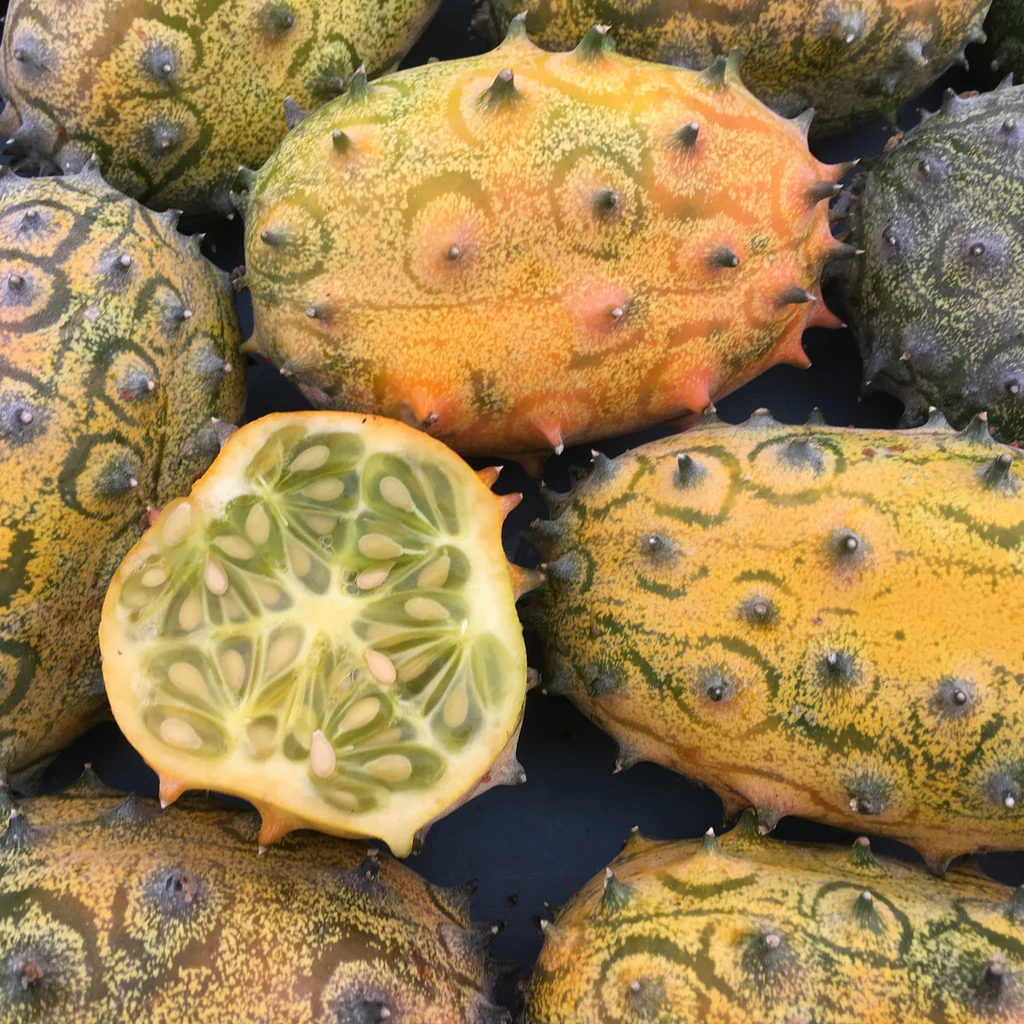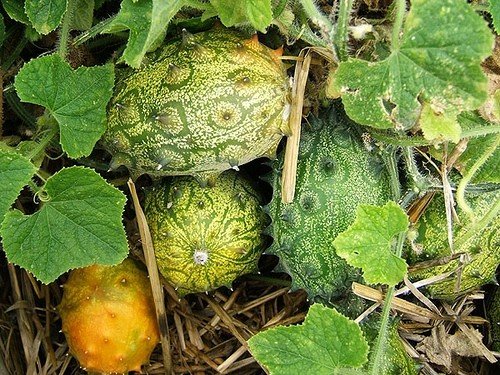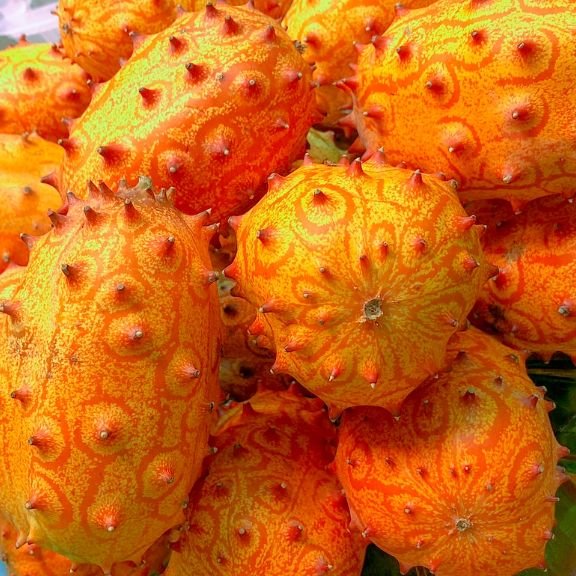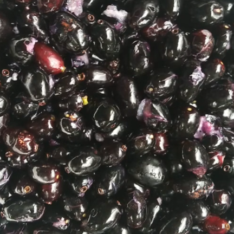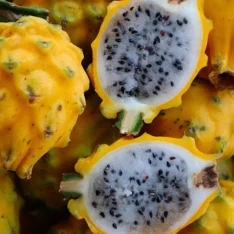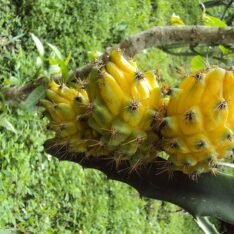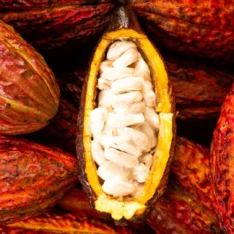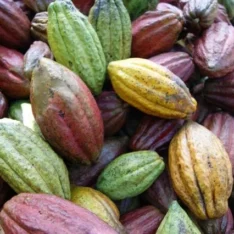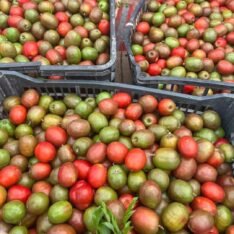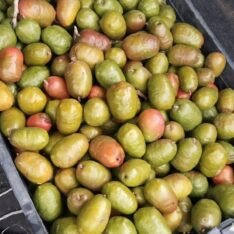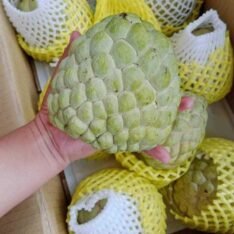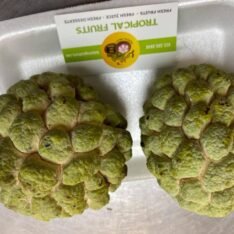Buy Kiwano Melon Fruit Box USA | Tropical Fruits Delivery
Price range: $15.00 through $245.00
- Its flavor is a refreshing blend of cucumber, lime, and banana.
- Enjoy it by scooping out the pulp, blending into smoothies, adding to fruit salads, or using in savory salsas and dressings.
- Rich in Vitamin C, Vitamin A, potassium, magnesium, and zinc, making it highly nutritious and hydrating.
Spike Up Your Fruit Game: Unboxing the Kiwano Melon Fruit Box!
Get ready for an adventure in flavor and a feast for the eyes! If you’re looking to truly broaden your fruit horizons, then the Kiwano Melon Fruit Box is your next must-try. Also known as the African Horned Cucumber or Jelly Melon.
This visually striking fruit, with its vibrant orange, spiky exterior and gelatinous green interior, looks like something straight out of a sci-fi movie. But trust us, it’s very real and incredibly delicious!
If you’re tired of the same old apples and bananas and crave something truly exotic, a Kiwano Melon Fruit Box promises a thrilling unboxing and a unique taste experience. Let’s delve into the world of this fascinating fruit!
What is Kiwano Melon? The “Horned” Wonder
The Kiwano Melon (Cucumis metuliferus) is a fascinating member of the cucumber and melon family (Cucurbitaceae). Native to the Kalahari Desert in Southern Africa, it’s a hardy vine fruit that has adapted to harsh conditions, becoming a valuable source of water and nutrients in its homeland.
What sets the Kiwano apart is its striking appearance and intriguing internal structure. When ripe, its thick, tough skin is a brilliant orange, covered in distinctive spiky horns. Slice it open, and you’re greeted by a vibrant, lime-green, jelly-like pulp filled with edible, pale seeds.
The taste of Kiwano is truly unique and often described as a delightful blend of several familiar fruits: imagine a refreshing mix of cucumber, lime, and banana, sometimes with hints of passion fruit or kiwi. This multifaceted flavor profile makes it incredibly versatile in the kitchen.
How to Consume Kiwano Melon Fruit: Scoop, Sip, or Stir!
Don’t let the spiky exterior intimidate you; enjoying a Kiwano Melon is surprisingly easy and delightful! The tough outer shell is not edible, but the vibrant pulp inside is your prize.
Here’s how to make the most of your Kiwano Melon Fruit Box:
-
Check for Ripeness: A ripe Kiwano will have a bright, intense orange skin. It should feel slightly heavy for its size. If it’s still green, it’s not ripe and will be much more tart.
-
Smoothies and Juices: The gelatinous texture and unique flavor of Kiwano make it an excellent addition to smoothies and fresh juices. Blend the pulp with other tropical fruits like banana, pineapple, or mango for a truly exotic beverage.
-
Fruit Salads: Add scooped or diced Kiwano pulp to your fruit salads for a burst of vibrant color, unique texture, and refreshing flavor. It pairs well with berries, citrus, and other melons.
-
“Bowl” Presentation: The hollowed-out Kiwano rind can even be used as a fun, natural serving bowl for fruit salads, sorbets, or cocktails, adding an extra touch of exotic flair to your presentation!
Kiwano Melon Health Benefits: A Prickly Powerhouse of Wellness
Despite its unusual appearance, the Kiwano Melon is a genuine nutritional powerhouse, packed with vitamins, minerals, and antioxidants that contribute to a healthy lifestyle. Don’t let the spikes deter you from enjoying the impressive Kiwano Melon Health Benefits.
Here’s a closer look at what makes this exotic fruit so good for you:
-
Hydration Hero: Kiwano melon has a very high water content (around 88%), making it incredibly hydrating and refreshing, especially in warm climates.
-
Rich in Vitamin C: This powerful antioxidant is crucial for boosting your immune system, protecting your cells from damage, and promoting healthy skin through collagen production.
-
Good Source of Vitamin A: Important for healthy vision, immune function, and skin health.
-
Zinc Power: It contains zinc, a mineral crucial for immune function, wound healing, cell growth, and even plays a role in vision, potentially reducing the risk of age-related macular degeneration.
-
Dietary Fiber: While the pulp is mostly water, the edible seeds and some of the gelatinous material contribute dietary fiber, which aids in digestion, promotes regularity, and helps maintain healthy blood sugar levels.
-
Low in Calories and Fat: This makes Kiwano a fantastic, guilt-free addition to any diet, especially for those managing their weight.
Kiwano Melon History and Origin: From Africa to the World
The Kiwano Melon Origin and History trace back to the semi-arid regions of Southern and Central Africa, particularly the Kalahari Desert. For centuries, it has been a traditional food source for indigenous populations in countries like Angola, Namibia, Botswana, and South Africa, valued for its hydrating properties, especially during dry seasons.
The fruit began its journey beyond Africa in the late 20th century. It was notably introduced to New Zealand in the 1980s, where it was given the catchy marketing name “Kiwano” (playing on its kiwi-like color and new home).
From New Zealand, its popularity grew, leading to cultivation in other temperate regions globally, including parts of the United States, Australia, Israel, Portugal, and Chile. Despite its relatively recent global spread, the Kiwano melon has quickly become a sought-after exotic fruit, appreciated for its striking appearance and refreshing taste.
Order Kiwano Melon Near Me? Finding Your Spiky Treasure
With its growing popularity, finding Kiwano Melon in the USA is becoming easier, especially if you know where to look. If you’re wondering, “Order Kiwano Melon Near Me?“, here are your best bets for finding a Kiwano Melon Fruit Box:
-
Specialty Grocery Stores: Many larger, upscale grocery chains and natural food stores across the USA are increasingly stocking Kiwano melons in their exotic produce sections. Stores like Whole Foods Market, Sprouts, Central Market, and some regional chains (e.g., H-E-B, Ralphs, Harris Teeter) often carry them, especially during peak season.
-
Asian or International Markets: While not a traditional Asian fruit, some larger international grocery stores that pride themselves on a diverse produce selection might carry Kiwano.
-
Farmers’ Markets (Limited): In warmer regions of the USA where conditions might be suitable for its cultivation (like parts of California or Florida), you might occasionally find local growers offering Kiwano melons at farmers’ markets. This is less common than in stores but worth checking if you support local agriculture.
Kiwano Melon Review: What People Are Saying
A Kiwano Melon Review often highlights its unique appearance and refreshing taste. Many describe the flavor as subtle yet distinct, making it a versatile ingredient. People particularly enjoy its hydrating quality and its ability to add an interesting visual and textural element to dishes.
Common feedback includes appreciation for its refreshing taste in smoothies and juices, its ability to elevate fruit salads, and its unexpected versatility in savory applications like salsas.
Some note that while the seeds are edible, some prefer to strain them out for a smoother pulp. Overall, it’s considered a fun, healthy, and exotic fruit that’s well worth trying for those who enjoy novel culinary experiences.
Spike Up Your Culinary Creativity
The Kiwano Melon is a truly captivating fruit that brings a touch of the extraordinary to your plate. From its striking Kiwano Melon Origin and History in the African deserts to its growing presence in American kitchens, it offers a refreshing escape from the everyday.
With its unique blend of flavors, impressive Kiwano Melon Health Benefits, and undeniable visual appeal, this “horned” wonder is a fantastic addition to any diet. So, if you’re ready to embrace the exotic and add a refreshing, nutritious, and visually stunning fruit to your repertoire, don’t hesitate.
Seek out a Kiwano Melon Fruit Box online or at a specialty grocer. It’s time to spike up your culinary creativity and discover the delightful world of Kiwano!
Additional Information
| QUANTITY | 1 Pound, 5 Pounds Box, 10 Pounds Box, 25 Pounds Box |
|---|


